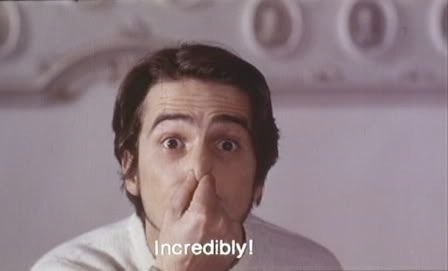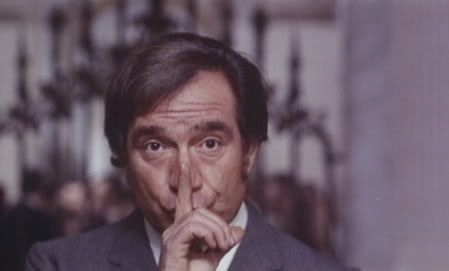Porcile (Pier Paolo Pasolini, 1969)
 Porcile is a criminally overlooked Pasolini triumph, the kind of bourgeoisie-smashing experiment that preceded Salo in both theme and style. Salo is the more famous and notorious of the two, but Porcile is equally damning of the dominant social structure. In the parallel stories, Jean-Pierre Leaud plays the son of a Nazi industrialist who has a big, big secret; and Pierre Clementi plays a young man in medieval times who kills and eats several people and finds his end at the hands of the church.  Leaud is wonderful in the role of Julian, a man who doesn't care about life, doesn't care about his girlfriend (Anne Wiazemsky, who was Mrs. Godard for a while in the 70s), and eventually falls into a coma-like state because of his ennui. He wakes up just in time for Ida to leave him, but he has a secret love that speaks volumes for Pasolini's feelings toward the upper-classes, especially those who profited during the second World War. Leaud's performance is quiet and disturbing, and while I couldn't stop thinking of him as Antoine Doinel (that's what happens when you take on a character so fully, I suppose), he plays Julian with the desperate emptiness the character embodies. Julian's father, who is the focus of the present-day story while Julian is in a coma, was a Nazi collaborator who now joins forces with another German industrialist in order to hide their collective pasts.  The second story, about the young cannibal, is less compelling, but simply because there are less dialogue and empathetic characters. The story is almost psychedelic at times, and when the religious elements come to punish the main characters, it reaches a fever pitch of imagery and meaning. Pasolini's direction is, as always, stupendous and beautiful, even though the DVD has a rather terrible transfer, subtitles that are in the middle of the screen, and possible dubbing (Leaud doesn't sound like himself, but the dubbing itself isn't bad). If ever there was a movie in need of a total restoration, this is it. Come on, Criterion Collection!  8/10 Labels: 1969, pier paolo pasolini |

Comments on "Porcile (Pier Paolo Pasolini, 1969)"
-
 katia said ... (11:46 AM) :
katia said ... (11:46 AM) :
post a commentPier Paolo Pasolini’s “Pigpen/Pigsty/La Porcile” is a detailed politico-philosophical statement in visual images about the sad state of what could be a moral evolution of the human specie. The film consists of two parts echoing one another. One depicts the destiny of a group of young cannibals surviving on the periphery of medieval country life, while the other (connected with the first through parallel montage) represents the life of a wealthy family in post-WWII Germany. Pasolini compares the ordeals of the medieval bums mad from hunger, with that of the son of a leading German corporate profit-maker, and his fiancée. His juxtaposition of the two historical periods produces astonishing results. The young leader of the local cannibals and son of the wealthy businessman, appear like brothers, even like twins by destiny. With unique images Pasolini sculpts the very logic of his medieval and modern young heroes’ intuitive perception of the reality, and explains how cannibalism (in the medieval part of the film), and bestiality of the son of the modern financial magnate come into existence. The director depicts these deviations not as “naturalistic” phenomena for the technicians of psychiatric diagnosis to brood about, but as a result of attempts by these two major characters to make sense of the world that surrounds them – each spontaneously metaphorizes his understanding of the reality, one into his cannibalism and the other into his bestiality correspondingly. In other words, their perversions are not reflection of their psychology as such or their “genes” but are results of their intellectual function that makes metaphors of their world (instead of just imitating it/adapting to it) by their very behavior. Pasolini’s representation of two types of grand-scale businessmen – the more traditional (trying to take into consideration the human and natural environment of their entrepreneurship), and the purely instrumental (oriented only on profit by any price), is shocking in its clairvoyance – by having predicted what we today observe in Europe and US: the morbid growth of profit-making practices neglecting concern for its social and environmental consequences. Director’s comparison of how differently language was used in medieval Europe and today is informing and stimulating. The exceptional performances of Pierre Clementi, Jean-Pierre Leaud, Anne Wiazemsky, Ugo Tognazzi, Ninetto Davoli and Alberto Lionello are character-, not circumstance-oriented. This style of acting is not suitable for passive/immediate identification of the audience with the personages that usually gives viewers a lot of easy, cheap and empty pleasure. The actors of “Pigpen”, on the other hand, discover their characters’ unique reactions even on seemingly trivial impressions. By Victor Enyutin